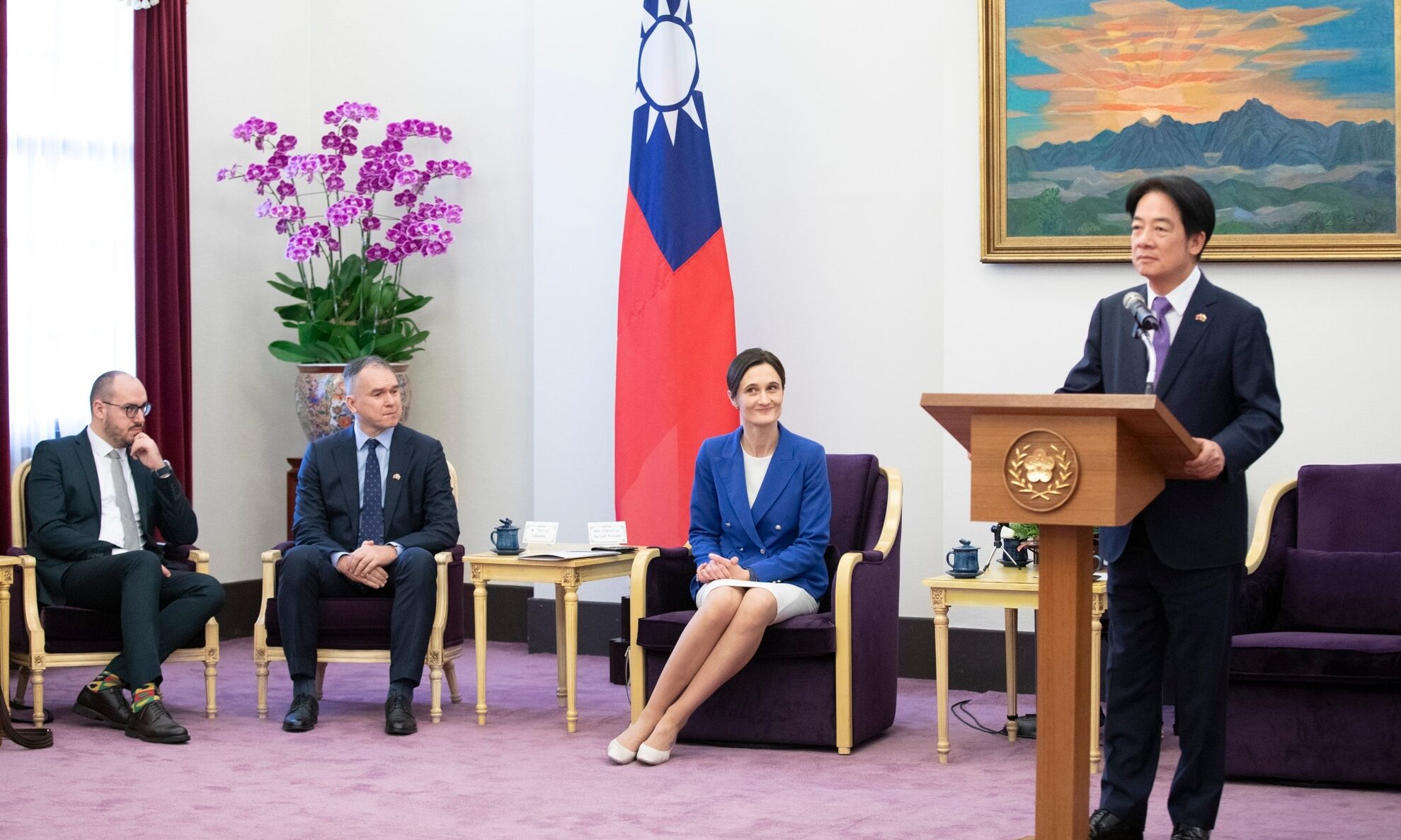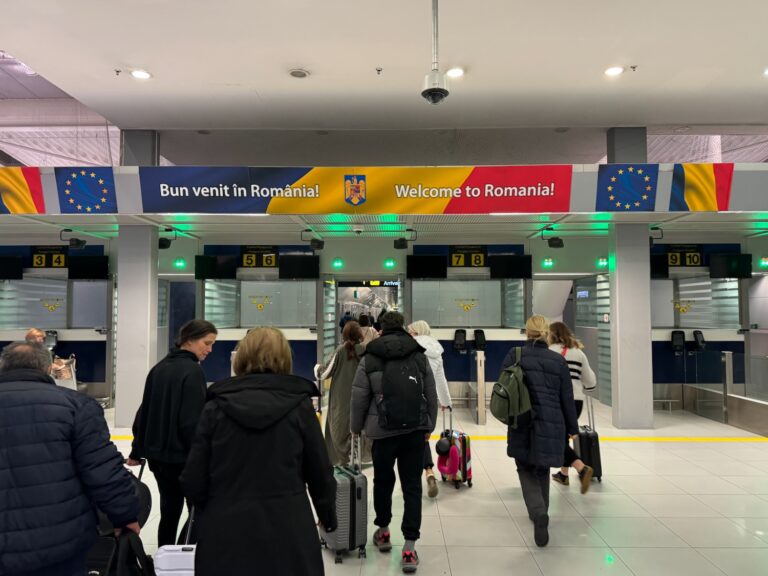
While Lithuania positioned itself as an early stalwart of closer ties between Europe and Taiwan, the sustainability of relations between Vilnius and Taipei remains in question. This is mainly due to domestic political competition, the Baltic country’s unfulfilled economic ambitions, and recent pressure on the Ingrida Šimonytė government to normalize relations with China. As we enter an election year, it is crucial to examine factors that could undermine the continued expansion of ties between Lithuania and Taiwan.
Relations between Taiwan and Lithuania saw significant developments in 2023. On the one hand, high-profile delegations, including the fall visit of Lithuanian Parliament Speaker Viktorija Čmilytė-Nielsen to Taiwan, served as a tangible manifestation of Lithuania’s commitment to expand its posture in the Indo-Pacific region as Vilnius pursues a value-based foreign policy and prioritizes cooperation with fellow democracies. On the other hand, Vilnius’ outreach to Taipei remains highly scrutinized amid intensifying domestic political rifts and the question of whether Taiwan can deliver on its promises of lucrative economic deals. Additionally, the recent efforts of the Ingrida Šimonytė government to “normalize” relations with Beijing suggest that Lithuania might recalibrate its approach to the island nation.
Taiwan was arguably the most high-profile example of Lithuania’s value-based foreign policy. Thus, examining the uncertain future of Vilnius’ relations with Taipei can also illustrate further concerns about the feasibility of the country’s normative global outreach. The question is – can ties between Vilnius and Taipei remain sustainable even in the case of a transfer of power in Lithuania?
The Taiwan Issue and Domestic Political Competition
Vilnius’ pivot to Taiwan was unequivocally a product of the political change initiated through the 2020 parliamentary elections. Gabrielius Landsbergis, grandson of the Lithuanian independence movement “Sąjūdis” leader, Vytautas Landsbergis, and chairman of the senior coalition partner, Homeland Union-Lithuanian Christian Democrats, found himself in a particularly powerful position as he ascended to the post of foreign minister. Despite tensions with President Gitanas Nausėda, Landsbergis enjoyed a close working relationship with Prime Minister Ingrida Šimonytė, and the coalition had a parliamentary majority with a 73 to 68 margin. In this context, Landsbergis has largely acted as the architect of Lithuania’s values-based foreign policy, which includes the country’s “all-in bet” on Taiwan.
Yet, as Lithuania gears up for presidential and legislative elections next year, the support for the current ruling coalition and its top figures remains at its nadir. According to a November poll by Baltijos Tyrimai, an independent public opinion research organization based in Vilnius, Landsbergis is the most unpopular politician in the country, disfavoured by 78 percent of the polled respondents. At the same time, the nation’s president, Gitanas Nausėda, is the most popular figure; 77 percent of the respondents had a favorable opinion of Nausėda, while 17 percent had a negative one. Critical of the current government’s Taiwan policy, he is also leading the polls ahead of the presidential elections.
Another Taiwan-skeptic figure, Lithuania’s Social Democratic Party (LSDP) leader, Vilija Blinkevičiūtė, came in third with 59 percent approval and 31 percent of respondents seeing her unfavorably. Her party also outperforms others in the polls ahead of the legislative elections. Following the opening of the Taiwanese Representative Office in Vilnius and the subsequent backlash from Beijing, Blinkevičiūtė criticized the naming of the office as “Taiwanese” rather than “Taipei” and called the government’s policy towards China “unprofessional.”
It is also essential to consider the solid Taiwan-skeptic stance of the LVŽS (Lithuanian Farmers and Greens Union), which is currently the largest opposition party in the Seimas. Notably, LVŽS treads closely behind LSDP as the second most supported political party. One of the most significant achievements of the Skvernelis cabinet, which preceded the current government, was the unprecedented opening of the Chinese market to Lithuanian agricultural and food products.
Giedrius Surplys, who served as the agriculture minister during that period, is currently a foreign minister in the shadow cabinet formed by LVŽS and remains one of Lithuania’s staunchest proponents of normalization of relations with the PRC instead of an expansion of ties with Taiwan. During the recent visit of Taiwanese Foreign Minister, Joseph Wu, to Vilnius, Surplys said, “It is clear that the whole world sees global politics differently than Vilnius does,” implying that pivoting to Taiwan and away from Beijing was a strategic mistake for Lithuania and an aberration from the global trend of accommodating rising China.
Ahead of the parliamentary elections which will take place before October 6, 2024, transfer of power in Lithuania appears likely. This is due to the strong performance of the Taiwan-skeptic opposition parties and the limited approval of the current ruling coalition. If strong relations with Taiwan are perceived as a partisan project of Landsbergis, they risk being eroded by his political opponents.
Limited Economic Gains
Additional difficulties in relations between Lithuania and Taiwan result from the limited economic benefits that Vilnius’ pivot to Taipei has produced so far. According to preliminary calculations of the Lithuanian National Bank, Chinese economic statecraft against Lithuania decreased its GDP growth by 0.1 to 0.5 percent in 2022 and between 0.3 to 1.3 percent in 2023. The lower numbers consider solely the impact of ceasing direct trade with China, while the larger negative numbers include the indirect effect on investments.
After the tensions flared up, Lithuania began to perceive Taiwan as a substitute market for China and a source of beneficial investments, including in strategic sectors such as semiconductors. The expansion of economic relations with Taiwan admittedly produced tangible results. The flagship investment has been the deal with Teltonika. The company received a $11 million grant from Taiwan’s Foreign Ministry and aims to launch domestic semiconductor production in 2027 using technology provided by Taiwan’s Industrial Technology Research Institute (ITRI). Cooperation between Teltonika and ITRI on semiconductor technology sharing marks the most extensive cooperation project between the institute and a foreign country.
Additionally, Taiwan made strides to increase market access for Lithuanian agricultural and food producers. This is particularly important given that in the “golden era” of Lithuania-China relations under the previous government, the opening of the Chinese market to agricultural and food products from Lithuania constituted one of the highlights of the relationship. Taiwan decided to trade barriers for Lithuanian egg, dairy, fish, and beef imports. Lithuanian cereal, previously a major export product to China, has also been granted access to the Taiwanese market, although the interest of Taiwanese customers remains low as they prefer American grains.
Despite these developments, some Lithuanian politicians and experts remain critical of the scope of economic interactions between Vilnius and Taipei, deeming it insufficient. In an interview with Žinių Radijas, Asta Skaisgirytė, chief advisor to President Gitanas Nausėda, said, “When the Taiwanese created their representative office in Lithuania, they promised huge investments and economic benefits. So far, not much has been seen.”
Members of the business community also express their dissatisfaction with the magnitude of economic interaction. Kęstutis Černeckas, a member of the Vilnius Chamber of Commerce, Industry and Crafts, commented, “Exports to the Taiwanese market look sad – after enormous efforts in opening representative offices, only €1.5 million more worth of goods were exported in the first quarter of this year than in 2022.”
The disappointment in Lithuania partially stems from the political and business establishment’s hopes that the nation could attract Taiwanese investments in semiconductor production facilities. In an effort to manage expectations regarding Lithuania’s aspirations, Taiwan’s Foreign Minister, Joseph Wu, remarked during his visit to Vilnius, “I don’t think it’s realistic that one European country could be the center of the entire [semiconductor supply] chain.” This implies that while Lithuania could benefit from the recently announced Taiwan Semiconductor Manufacturing Company’s (TSMC) investment in Dresden, Germany, the Baltic nation should not expect to become the center of semiconductor production for Europe. Still, the resulting disappointment can drive Lithuania farther away from Taiwan.
“Normalization” of Relations between Vilnius and Beijing?
While relations between Taiwan and Lithuania are at a crossroads due to domestic political competition and Vilnius’ voracious hunger for more high-tech investments from Taipei, the China factor is also at play. Shortly before this year’s EU-China Summit, the first face-to-face meeting of EU and Chinese leaders since 2019, Beijing embarked on a “charm offensive” as it curtailed economic restrictions it imposed in Lithuania in 2021. This move followed Landsbergis’ announcement of the ongoing talks between Vilnius and Beijing aimed at “normalizing” relations between both countries.
Following two tumultuous years in relations between Vilnius and Beijing, the sudden declarations of the quest to normalize the bilateral relations cast further doubt about the future of the Baltic country’s outreach to Taiwan. Importantly, the unveiling of the negotiations between Lithuania and China coincided with the Vilnius leg of Joseph Wu’s visit to the three Baltic countries. While the level of Wu’s meetings in Vilnius was higher than in Riga or Tallinn, the Taiwanese foreign minister did not interact with Landsbergis or any other ministers, as the Lithuanian government reiterated its adherence to its One-China Policy.
Landsbergis’ withholding of a meeting with Wu attracted censure from some members of the policy circles in Vilnius, including political analyst Marius Laurinavičius who criticized the Lithuanian foreign minister’s position as “completely inconsistent.” Without naming Landsbergis directly, President Nausėda also hit at the politicians of the ruling coalition for “throwing [themselves] from one extreme to another” in their efforts to shape the country’s relations with China.
As we enter an election year in Lithuania and Taiwan, relations between the two remain shaky. Lithuania’s relations with China and economic benefits from the current government’s efforts to act as a normative global actor remain closely scrutinized by the opposition, which adds to the uncertainty about the future trajectory of Vilnius’ outreach to Taipei. The new incoming head of the Taiwanese Representative Office in Lithuania will face a critical challenge of further institutionalizing the relatively novel ties between both countries and reaching out to key actors in the opposition. While Lithuania positioned itself as an early stalwart of closer ties between Europe and Taiwan, it remains to be seen whether its relations with Taiwan will remain sustainable or will rather be dismissed as a partisan project of the volatile liberal-conservative coalition.
Written by
Marcin Jerzewski
yehaoqinMarcin Jerzewski is the Head of Taiwan Office of the European Values Center for Security Policy. He is also a Marcin Król Fellow at Visegrad Insight. Marcin earned his Bachelor of Arts in Political Science and Chinese Studies at the University of Richmond and was an MOE Taiwan Scholar in the International Master’s Program in International Studies, National Chengchi University.

